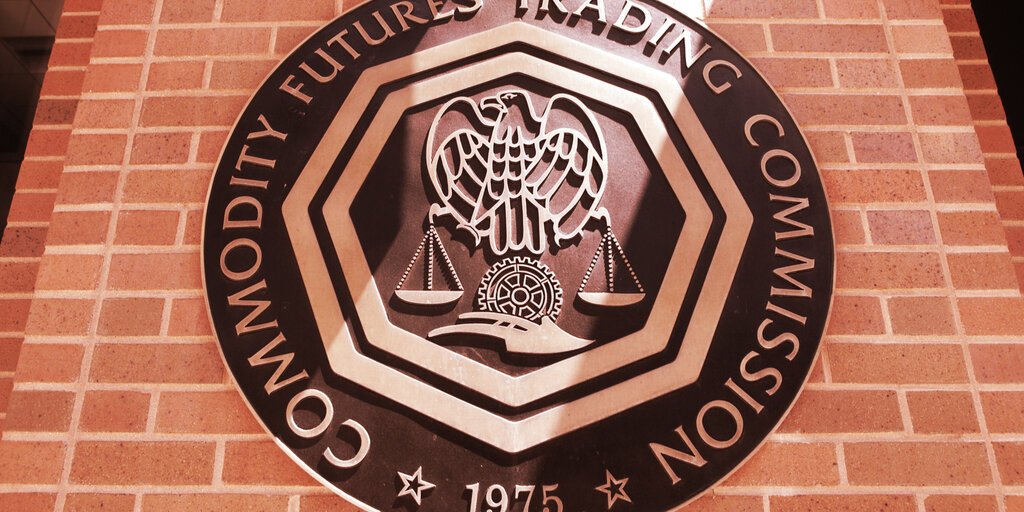Talk of crypto policy in the U.S. tends to revolve around rumblings from the Securities and Exchange Commission and taxes.
But there are two bills in Congress that have largely flown under the radar, at least for people outside the policy wonk crowd. They would decisively give the Commodities Futures Trading Commission more power. What’s more, they got a hearty endorsement from Coinbase Head of U.S. Policy Kara Calvert.
“We’re very supportive of two efforts, one in the House, one in the Senate, that would provide spot authority to the CFTC. That’s by Senators Stabenow and Boozman, and Representatives Thompson and Khanna in the House,” Calvert told Decrypt during an interview at the Messari Mainnet conference in New York.
Having spot authority would mean that the CFTC oversees real time trading on crypto exchanges, like when someone buys Bitcoin with U.S. dollars or swaps Ethereum for a token on Coinbase or FTX.
The CFTC already shares regulatory oversight of derivative products, like futures, with the SEC.
Futures are a type of investment product that allows traders to bet on whether an asset’s price will go up or down at a later date. And they’ve become increasingly popular with crypto investors. In fact, crypto exchanges Crypto.com, Coinbase, and FTX have all been vocal each time they acquired companies with existing CFTC licenses.
The distinction between spot and futures trading—and which regulator has jurisdiction over them—has been an important one.
As recently as yesterday, SEC Chair Gary Gensler made the case that the vast majority of crypto assets qualify as securities and that exchanges should have to register with the SEC.
“Given that most crypto tokens are securities, it follows that many crypto intermediaries are transacting in securities and have to register with the Securities and Exchange Commission (SEC) in some capacity,” he said in a statement before the Financial Stability Oversight Council meeting.
He later added that there’s a possibility “crypto intermediaries,” like exchanges, may need to register with both the SEC and CFTC. But the two bills that Calvert flagged both specify that the CFTC would have exclusive jurisdiction over “digital commodities.”
“Those bills are trying to get to the heart of, what is a non-security and how do we regulate that in a smart way that allows for innovation,” Calvert said.
There’s been much hand wringing in crypto over the so-called Howey Test, a four-pronged assessment that regulators and courts use to decide whether an asset qualifies as a security under U.S. federal law. Over the summer, in a complaint against a former Coinbase employee accused of insider trading, the SEC revealed that it believes at least nine assets that were trading on Coinbase are unregistered securities, which would mean that both Coinbase and the issuers of the assets could be in violation of federal law.
Sens. Debbie Stabenow (D-MI) and John Boozman (R-AR) introduced their Digital Commodities Consumer Protection Act of 2022 in August. The bill very pointedly calls Bitcoin and Ethereum “digital commodities,” as opposed to securities, and says that the CFTC would have exclusive jurisdiction over them.
Following the introduction of the bill, The Washington Post reported Boozman said on a press call that he’s heard from the crypto industry that they “almost universally” prefer to be regulated by the CFTC.
The bill also says that the CFTC’s jurisdiction would not include crypto transactions for goods and services, like using Bitcoin to buy a cup of coffee. Stabenow and Boozman’s bill was last discussed in the Senate agriculture and banking committees on September 15, but there have been no amendments or new versions filed.
In the House of Representatives, Reps. Ro Khanna (D-CA), Glenn Thompson (R-PA), Tom Emmer (R-MN) and Darren Soto (D-FL) have a similar bill pending, the Digital Commodity Exchange Act of 2022. It was introduced in April, then referred to the Subcommittee on Commodity Exchanges in early May.
The House bill, like its counterpart in the Senate, would update the Commodity Exchange Act to define digital commodities as “any form or fungible intangible personal property that can be exclusively possessed and transferred person to person without necessarily reliance on an intermediary” and give the CFTC sole jurisdiction over their regulation.
Blockchain Association Executive Director Kristin Smith said she’s also keeping tabs on the two bills that would clarify the CFTC’s role in regulating crypto.
“The commodities spot market, there’s a lot of work going on behind the scenes right now,” Smith told Decrypt during the Mainnet conference.
She’s more optimistic about the TRUST Act, introduced in March by Sen. Pat Toomey (R-Pa.), which would set up rules for stablecoin issuers.
“The stablecoin one is looking really good,” Smith said.
The brief text of the bill would require centralized issuers, such as Tether and Circle, to back their stablecoins with fiat currency or high-quality government securities that mature in 12 months or less. It also requires issuers to publish reports on their reserves every 30 days. So far, there’s been no further action on the stablecoin bill.
Stay on top of crypto news, get daily updates in your inbox.
Source: https://decrypt.co/111106/coinbase-very-supportive-cftc-bitcoin-ethereum



